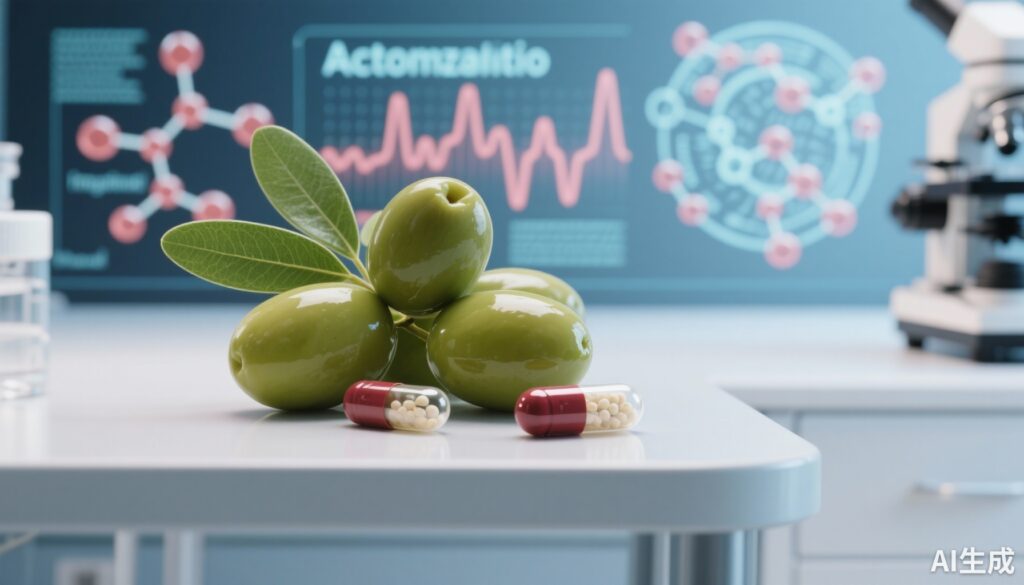Highlight
• Hydroxytyrosol (HT) supplementation at 15 mg/day for 16 weeks significantly reduced oxidized LDL, protein oxidative damage, and DNA oxidation markers in overweight adults with prediabetes.
• HT prevented declines in total antioxidant capacity and glutathione peroxidase activity, supporting sustained antioxidant defense.
• An anti-inflammatory effect was demonstrated by significant reductions in circulating interleukin-6 (IL-6) levels.
• No changes were seen in lipid profile, body weight, or lifestyle factors, and no adverse events occurred, indicating safety and tolerability.
Study Background and Disease Burden
The metabolic condition of prediabetes, marked by impaired glucose regulation, often coexists with overweight and obesity, affecting a growing proportion of the middle-aged population globally. These individuals are at heightened risk for type 2 diabetes mellitus (T2DM), cardiovascular disease, and other aging-associated disorders. Oxidative stress and chronic low-grade inflammation are recognized pathogenic contributors to the progression of metabolic dysregulation and vascular complications in this group.
Hydroxytyrosol is a phenolic compound derived predominantly from olives and extra virgin olive oil, recognized for potent antioxidant and anti-inflammatory effects in vitro and in vivo. While its health benefits within the Mediterranean diet matrix are well established, less is known about the preventive efficacy of isolated HT supplementation, particularly in high-risk populations such as overweight individuals with prediabetes. Exploring targeted nutraceutical interventions like HT could support disease prevention strategies beyond lifestyle modifications.
Study Design
This investigation was a randomized, double-blind, placebo-controlled parallel clinical trial enrolling adults aged 40 to 70 years with overweight and prediabetes. Participants were randomized to receive either 15 mg of hydroxytyrosol daily or a placebo for 16 weeks. Primary endpoint focused on oxidized low-density lipoprotein cholesterol (oxLDL) levels, a biomarker of oxidative modification contributing to atherogenesis.
Secondary outcomes included a comprehensive evaluation of metabolic and biochemical parameters, biomarkers of oxidative damage such as protein carbonyls and 8-hydroxy-2′-deoxyguanosine (8-OHdG), antioxidant enzyme activities (notably glutathione peroxidase, GPx), inflammatory mediators including interleukin-6 (IL-6), and assessments of lifestyle variables like sleep quality, mental well-being, and physical capacity.
Compliance was objectively measured by urinary HT-3′-sulphate levels, a metabolite indicating systemic HT uptake.
Key Findings
Of 52 randomized participants, 49 completed the study and were analyzed (HT group, n=24; placebo group, n=25). Compliance was successfully demonstrated by a significant rise in urinary HT-3′-sulphate in the HT group compared to placebo (p=0.039).
The hydroxytyrosol group experienced a statistically significant reduction in oxLDL levels (p=0.045) relative to placebo, indicating diminished lipid oxidative stress, a critical factor in early vascular damage. Concurrently, markers of oxidative protein damage (protein carbonyls, p=0.031) and oxidative DNA damage (8-OHdG, p<0.01) were significantly lowered with HT supplementation.
In contrast to a decline in total antioxidant status and GPx activity seen in the control group, hydroxytyrosol prevented these reductions (p<0.01 for both), suggesting a protective effect on endogenous antioxidant defenses.
An anti-inflammatory effect was evidenced by a significant decrease in circulating IL-6 levels (p=0.05), an inflammatory cytokine commonly elevated in metabolic disorders and linked to adverse cardiovascular outcomes.
Importantly, no significant differences were observed in traditional lipid profile parameters (total cholesterol, LDL-C, HDL-C, triglycerides), anthropometric measures (such as BMI or waist circumference), or lifestyle indicators, supporting the selectivity of HT's biochemical effects.
The intervention was well tolerated, with no adverse events reported throughout the 16 weeks.
Expert Commentary
This robustly designed clinical trial adds valuable evidence supporting hydroxytyrosol’s role as a dietary supplement to improve oxidative and inflammatory states in a high-risk population. The reduction in oxLDL and oxidative damage markers aligns with mechanistic studies demonstrating HT’s ability to scavenge free radicals and modulate redox balance.
The preservation of GPx activity is particularly noteworthy as this enzyme is critical for mitigating hydrogen peroxide and lipid hydroperoxide toxicity, thereby protecting cellular components and vascular integrity. The anti-inflammatory trend observed with IL-6 reduction further complements HT’s preventive potential, considering inflammation’s central role in metabolic deterioration and vascular disease progression.
However, the lack of change in lipid profiles and anthropometric measures indicates that HT’s benefits may lie more in mitigating biochemical perturbations rather than inducing weight loss or lipid improvements over a relatively short period. It would be valuable to explore longer-term effects and whether HT can modify clinical outcomes such as progression to diabetes or cardiovascular events.
Additionally, the study’s compliance verification through urinary metabolites strengthens confidence in the intervention’s internal validity. Future research might assess dose-response relationships and synergistic effects of HT with lifestyle interventions.
Conclusion
In summary, this randomized, placebo-controlled trial demonstrates that chronic supplementation with 15 mg/day of hydroxytyrosol for 16 weeks significantly enhances antioxidant defenses and reduces inflammatory markers in overweight adults with prediabetes. These data indicate that HT supplementation may represent a promising preventive strategy to counteract oxidative and inflammatory processes underlying aging-related metabolic and vascular diseases.
Further large-scale studies with longer follow-up are warranted to confirm clinical benefits and elucidate mechanistic pathways. Meanwhile, hydroxytyrosol emerges as a safe, well-tolerated nutraceutical candidate for mitigating oxidative stress and low-grade inflammation in at-risk populations.
References
Moratilla-Rivera I, Pérez-Jiménez J, Ramos S, Portillo MP, Martín MÁ, Mateos R. Hydroxytyrosol supplementation improves antioxidant and anti-inflammatory status in individuals with overweight and prediabetes: A randomized, double-blind, placebo-controlled parallel trial. Clin Nutr. 2025 Sep;52:17-26. doi: 10.1016/j.clnu.2025.07.006. Epub 2025 Jul 12. PMID: 40690822.
Additional literature consulted:
– Visioli F, et al. Olive oil phenols: biological activities and potential health benefits. J Agric Food Chem. 2000.
– Covas MI, et al. The effect of polyphenols from virgin olive oil on heart disease risk factors: a randomized trial. Ann Intern Med. 2006.
– Esposito K, et al. Oxidative stress in metabolic syndrome. Curr Pharm Des. 2013.



